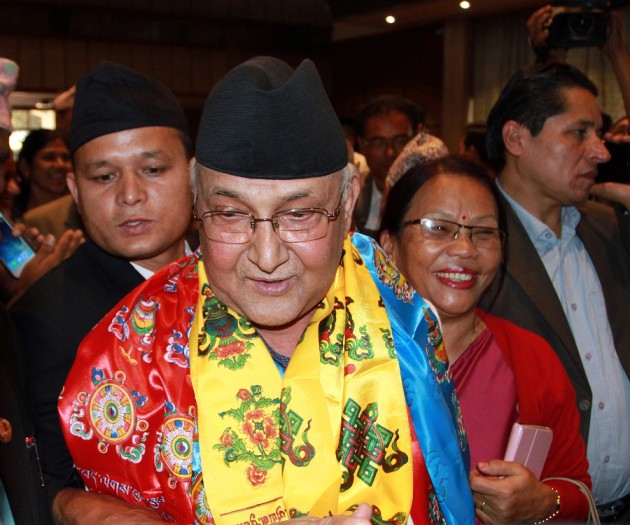Prime Minister Oli at the helm amidst a flurry of challenges ahead
 Pritam Bhattarai / Kathmandu: As CPN-UML Chairman KP Sharma Oli was elected the Prime Minister of the Federal Democratic Republic Nepal on Sunday, he was greeted with a host of responsibilities including among others of spearheading the nation towards much-needed economic development.
Pritam Bhattarai / Kathmandu: As CPN-UML Chairman KP Sharma Oli was elected the Prime Minister of the Federal Democratic Republic Nepal on Sunday, he was greeted with a host of responsibilities including among others of spearheading the nation towards much-needed economic development.
The easier it proved for leader Oli to have been elected as PM, the harder is the way ahead for him. The uphill tasks ahead for the new Prime Minister to deal with range from addressing concerns of the agitating groups including the Madhes-centric political parties, mending ties with neighbouring India and implementing the new constitution. It may be noted that the protests in the Southern plains have been ongoing for the past two months, in expression of the some section of the society’s displeasure over the newly promulgated constitution. Hence, taking them into confidence for them to take ownership of the constitution and to ease the prolonged restrictions on the Nepal-India border would be crucial.
However, the fact that a congratulatory message by India’s Prime Minister Narendra Modi to PM Oli shortly after he was elected as PM of Nepal, inviting him to visit India is positive a move, especially at a time when New Delhi is more or less disappointed at the major political parties for failing to address some of its concerns while drafting the new constitution. And hence, India was reluctant to welcome the new constitution.
Though the fact that the invitation by India to a newly elected Prime Minister of Nepal is age-old customary gesture, foreign affairs experts see the Indian PM’s invitation to Prime Minister Oli to visit India as a positive move. They say that Modi’s such step aims at normalising Nepal-India relations recently disturbed after the restrictions.
Foreign affairs expert Rajeshwor Acharya said that India was looking forward to an opportunity to normalise Nepal-India relations that were disturbed after the restrictions and the change of the government served a way for India to do so.
Here again, if the customary practice for a new PM of Nepal to pay state visit to India first, except for former PM Pushpa Kamal Dahal who paid his state visit to China first instead of India upon becoming Nepal’s PM, is anything, new PM Oli will pay state visit to India first. The fruitfulness of PM Oli’s expected state visit to India lies in his capacity of how well he would take up Nepal’s matter with New Delhi, which would help ease the restrictions, make influence on Indian government to make feasible foreign policy towards Nepal and stay away from signing any agreement that are detrimental to Nepal.
In the meantime, Prime Minister Oli took a step forward to resolving the impasse in the Tarai by extending an invitation to agitating parties for a dialogue. This was the first decision taken by the maiden cabinet meeting led by the new Prime Minister. It may also be noted that leader Oli had, in his candidacy speech at the parliament, pointed out to him being portrayed as one being against the Madhesi, Janajati and Tharus. Outrightly denying the allegation, leader Oli pledged before the house that it would be his priority, if elected the new PM, to address the legitimate concerns of the marginalized population of the country. On the other hand, as Prime Minister Oli assumed his office, supplies from across the border has to some extent eased as well.
After Prime Minister Oli finishes with the sharing of power among his coalition partners, including the posts of Speaker and Deputy Speaker and President, Vice-president, most probably after the Dashain festival, he will have to focus on more difficult issues. And, the foremost and challenging would be to amend the new constitution, by taking the opposition into confidence, so as to accommodate the aspirations of the dissenting forces. He will then have to kick start the implementation of the new constitution, for which, as he outlined in the house on Sunday, around 100 laws have to be amended. And elections to the provincial and local level governments have to be held as well within the remaining two years term of the reformed Legislature-Parliament.
Though the road ahead seems very challenging, given the experience leader Oli has had so far and his strong determination to prove a point or two, it would not be surprising to see him sail through with flying colours. Hence, the days ahead is indeed an excellent opportunity for Prime Minister Oli to establish himself as a statesman that has been so rare to find in the Nepali field of politics for a very long time. RSS
